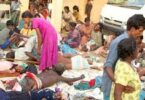Christophe Farnaud
On Thursday, as on May 9 every year, we celebrate Europe Day. On this day in 1950, the Schuman Declaration laid the foundations for today’s EU. Initially an initiative to combine European economies in order to prevent war, it evolved into one of the most successful integration projects in history. The 27 member states of the EU share a clear vision of promoting peace, stability and prosperity within and beyond our borders. This implies that we defend and promote our values and our interests in accordance with international law. It is a constantly renewed effort and we are currently adjusting again to the new and dangerous realities of the world.
This means that we need partners. No country, no power can face today’s challenges alone. Against this backdrop, the Gulf Cooperation Council countries, as an organization and as individual countries, are strategic partners for Europe, with whom a new dynamic has been launched.
This is particularly true about Saudi Arabia. The Kingdom, through the implementation of Vision 2030, is going through a spectacular process of transformation in all fields that strengthens its role, regionally and globally. Riyadh today is an exciting place to live and work. Every day brings new achievements, new projects, something new to discover. In support of its vision, Saudi Arabia has pursued a foreign policy aimed at de-escalation, the easing of tensions and the strengthening of peace in the region.
The EU, already a major partner of Saudi Arabia, supports these changes. As a reflection of this new reality, the partnership between Saudi Arabia and the EU is increasingly close, solid and productive. The past year saw an unprecedented number of high-level visits from Europe to Saudi Arabia and vice versa. Beyond the regular visits of the EU Special Representative for the Gulf Luigi Di Maio, a number of EU commissioners visited the Kingdom to discuss cooperation in energy and trade, some of them even twice. Josep Borrell, the high representative for foreign affairs and security policy and vice president of the European Commission, visited Riyadh in January and again last week, on the occasion of the World Economic Forum special session — an event that provided further evidence of how Riyadh has become an important focal point for international meetings.
In the context of growing international tensions, this partnership has a political and security dimension. In January, the EU and the GCC held their first Regional Security Dialogue in Riyadh, followed by a High-Level Forum on Regional Security and Cooperation at ministerial level last month in Luxembourg. These exchanges, reflecting common views and interests for the most part, are indispensable. We must work together to build lasting solutions.
This is true about the terrible situation in Gaza. Beyond urgent humanitarian measures — in total, since October, the EU and its member states have mobilized more than €690 million ($742 million) in assistance to the Palestinian people — our priorities remain the establishment of a ceasefire and the release of hostages, but also to avoid regional escalation and to work together toward a sustainable solution, the two-state solution.
This is also true of the Russian aggression against Ukraine. Europe’s support to Kyiv is constant. We appreciate the diplomatic efforts of Saudi Arabia.
More broadly, the relations remain dynamic in all fields. Just a few weeks ago, the European Commission updated the rules on Schengen visas for Saudi, Omani and Bahraini nationals, who are now able to acquire a five-year multiple-entry visa with their first application. This important measure will make it easier for citizens of the GCC countries to visit Europe, which is a destination they know well. At the same time, European citizens are more and more interested in visiting Saudi Arabia and in experiencing its great hospitality. We will continue working to achieve further easing of the travel between our countries.
In the economic and trade arena, significant accomplishments in recent months emphasize the strength of the exchanges. In October, the first EU-KSA Investment Forum was held in Riyadh, with about 1,500 registered companies. This week, we launched the European Chamber of Commerce in Saudi Arabia, another milestone in our economic relations. This chamber, the first in the Gulf, is from companies, for companies. It will contribute to strengthening the voice of our companies in Saudi Arabia in order to build new partnerships with our Saudi friends.
European companies have already built a strong foundation in the Kingdom. We are collectively the second most important trading partner of Saudi Arabia and the first foreign investor. More than 1,300 companies from the EU have invested in the Kingdom. However, the economic dynamics in the Kingdom and in Europe, as well as our common global challenges, like climate change and a just energy transition, offer much room for further collaboration at both the public and private levels.
I also want to highlight our excellent cooperation in the field of higher education. Investing in the youth is the most promising way of promoting our relations. We are also proud to develop our relations with Saudi universities. I hope the Erasmus+ program, which is accessible to Saudi universities, will facilitate more exchanges of students.
To strengthen people-to-people contacts and mutual understanding, the EU has launched several events, such as the European Film Festival, the European Food Festival, the Night of European Languages and the European Week of Music. On Thursday, we are also launching Europe Month, a series of cultural events to encourage further cultural exchanges between Europeans and Saudis. Even in sports, the relations are stronger than many think, from famous European football players playing here to their European coaches and the Dakar Rally.
More cooperation will allow us — the EU, Saudi Arabia and the GCC — to strengthen our accomplishments by making us more resilient and stronger. Together, we will be able to do more for a future of peace and prosperity.







